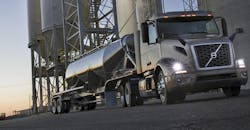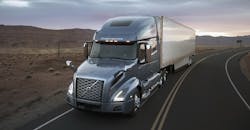VTNA looks to simplify, optimize the complexities of truck spec'ing
Spec'ing a heavy truck is a bit like itemizing deductions and filing taxes—it's a different world than buying a passenger car. Heavy trucks have myriad choices for the build, including add-on options and equipment, but Volvo Trucks North America is looking to help streamline things particularly as technology keeps changing and adding to the complexity.
The OEM has launched options packages to help make sure buyers aren't missing potential advantages for trucks based on the particular fleet application. For instance, VTNA yesterday announced a new weight-saving options group called Payload Plus available for its VNR regional-haul and VNL long-haul trucks, following up on the Xceed fuel-efficiency package for VNL 760 and 860 trucks showcased in late October.
With practically endless ways to spec a truck, fleets often may arrive at a formula over time for what works and stick with it—even if that formula is no longer optimal. "We're really trying to dissuade customers from just spec'ing based on tradition," noted VTNA spokesman Brandon Borgna. VTNA's new options packages "simplify the spec'ing process and bring all the best features together so that things aren't overlooked," he said.
The Payload Plus packages, which can be ordered now, shave off up to 540 lbs. from Volvo VNR regional-haul models and more than 335 lbs. from Volvo VNL long-haul models. They help maximize payload and fuel efficiency in applications like tanker, bulk-haul, and some dry van and refrigerated trucks.
Lightweight components with Payload Plus include aluminum wheels, special chassis components, and horizontal exhaust. Depending on the application, weight can be further reduced by specifying optimized wheelbases and frame rail thicknesses.
The results can be dramatic: "We hear from some fleets, particularly in bulk applications, that every pound of additional payload can equate to an additional $10 or more per job, so the Payload Plus packages represent a tremendous business opportunity," said Chris Stadler, product marketing manager at VTNA.
Bulk haul and tanker trucks typically hit max weight before their trailers are full, he noted, "so reducing weight from the trailer and tractor can translate into greater payload capacity."
The Xceed package for VNL 760 and 860 trucks includes Payload Plus along with powertrain combinations, engine options, and a docket of aero features. Spec'ing Xceed can give a VNL 760/860 up to an 11% fuel economy boost, according to VTNA.
Another factor here for fleets is if you're going from one manufacturer to another, truck spec'ing isn't apples to apples. "If you were to compare optimal trailer gap for fuel efficiency with a Volvo, it's going to be different than a comparable model from another OEM," Borgna pointed out.
The additional, finer details are up to the particular fleet and its needs, and ultimately a grain hauler may want different truck specs than a fuel hauler, for instance. VTNA's Xceed and Payload Plus packages are meant to give buyers a base to work from.
"Everything is really application-specific, but this gives people a good opportunity to start from something as opposed to just looking at an order sheet and going, 'Wow,'" Borgna said.
About the Author
Aaron Marsh
Aaron Marsh is a former senior editor of FleetOwner, who wrote for the publication from 2015 to 2019.

